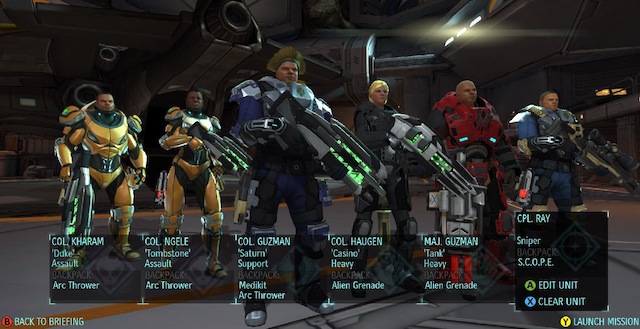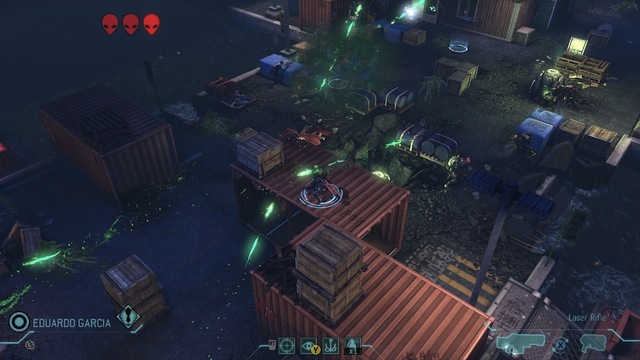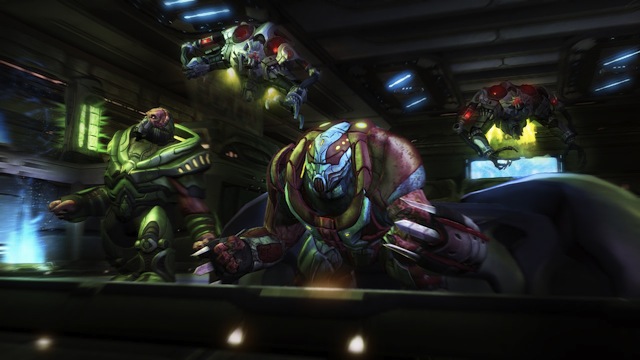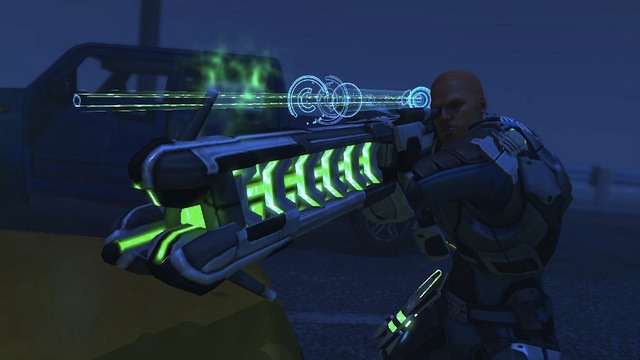Elite sniper Alex Osborn rolled out of covered and lined his sights on the Muton crouching behind the trash can.
The debris from the rocket explosion continued to spill out of the now open-air train car. Severino had served his purpose before his untimely death, taking a trio of Thin Man enemies from long distance. At this point I didn't care how many humans the aliens had taken, and I didn't care about the four scientists that would join X-COM if I secured victory. It was personal.
Despite all the opportunities 2K Games has had (and acted upon) to turn X-COM into a generic first-person shooter, Enemy Unknown sends a very specific message to fans of the storied strategy series: You can save us. Upon my arrival at the international X-COM base in Europe, I was still wondering if that was possible.
It doesn't take long for Enemy Unknown to sink its… well, aliens don't really have jaws, and X-COM's aliens don't have claws, per se… Okay, whatever metaphor I'd like to develop out of this, it's safe to say that Firaxis X-COM debut is addictive. Players will find no wasted time and a distinct lack of a boring tutorial they'd like to skip. From the first moments, you'll be taught tactics, risk-and-reward, and the way to win, but you might not know it at first.
I have to commend Firaxis for not only teaching newbies the ropes in seamless fashion, but also for getting to the point at which choices actually mean something to the player so rapidly. Choices as to what your scientists should research or what your engineers should build occur in between on-the-ground battles that make up the bulk of gameplay.
Where as scientists typically spend most of their time researching and studying the corpses, technology, or random garbage you drag home from the battlefield, engineers seem to serve a much more impactful purpose on your ability to wage war. They build the weapons your researchers discover in their work, expand your base through excavation and construction of new labs, and provide the satellites, fighter jets, and ammunition you need to protect the world. EU really shines when players employ their soldiers, scientists, and engineers such that each serves a vital purpose.
Early in the game, players will bring home the wreckage of a downed UFO. Your scientists can research these materials and develop the Arc Thrower, a shock device that incapacitates enemies. Your engineers can build these stun-guns and your soldiers can equip them. Careful play will reduce an enemy's health and a well-placed Assault-class soldier can shock an alien beast. Bring a captive home alive and your scientists can research even greater technology, your engineers can build even better weapons, and your force can grow stronger and deadlier.

This larger gameplay loop encircles smaller chunks of entertainment that keep players constantly engaged, always inching forward towards a well-defended, calm Mother Earth. It's hard to put the controller down when you could fight one more battle, rescue a few more civilians, gather a few more materials, or even earn a commendation from the council.
As in-game months begin and end, the council will be there to grade your progress, your ability to defend Earth, and reward you with money. Earning a big payday is like opening a box of chocolate and finding a complete absence of coconut. I found myself making ends meet between these reviews by selling off spare goods recovered from battles. I'd sell spare corpses, alien technology, and even the spare UFO energy drive when I could go without one.
Players can speed up time by scanning for alien events around the globe. If your satellite detects a UFO, you can scramble the jets. If a UFO lands outside of your coverage ("Can you abduct me now? Good."), you'll be tasked with recovering abductees. Before heading off to combat, you can pick each member of your squad and equip them with the right tools for the job. Actual fighting is turn-based and heavily grounded in dice-rolling.
Whether you're dealing with a sniper or a shotgun-toting run-and-gun soldier, every shot has a percentage chance to hit. Firing on an alien standing right in front of you has a higher percentage, while a shot on an enemy moving from cover-to-cover will have lower odds. It's easy to pick up and enjoy EU's combat, but the cracks show as you get deeper and deeper.
While the PC version of X-COM handles beautifully, the PS3 and Xbox 360 versions can really chug, as if that $250 machine sitting under your TV couldn't handle the simple math. It's frustrating to wait for what feels like ages only to find out your million-dollar soldier of international significance whiffed. It's even more frustrating when the game crashes after turn 20.
I don't mind reloading my save to undo mistakes I've made, but when the game decides I'm doing too well in a match and takes a dump on me, I get a little pissed off. Despite that, when X-COM's battles work, they are tense, taught affairs that can leave you jittering with anxiety and fearing for the lives of Anthony Severino and Nick Tan.
Enemy Unknown allows you to customize every minutia of your soldiers. You can change their name, their race, their height, their country of origin—even swap their gender (which at the moment results in a horrifying glitch). Bringing a personal touch to your team allows you to tell some wild stories.
For example, a crucial engagement happened to fall on day after Jonathan Leack's long recovery from a plasma wound to his face. I put him back in the saddle and strapped a shotgun to his back. Equipping him with Titan Armor and an Arc Thrower, I figured he'd be good as a front-line sponge, ready to lasso an enemy that fell below the Arc's recommended minimum health level. On my way to defending Mumbai, India, Jonathan shot three floaters and two grunts in the face. Even when I thought his shotgun would leave enough bars on a freakish Chrysalid, he went and blew a critical round in the alien's face. "Boom, headshot," Jonathan muttered.

While Firaxis has stayed true to the difficulty of X-COM, I can say with confidence that your experience will only get better the harder you push yourself. Losing soldiers is a central part of getting better and understanding the game's systems on your way to victory. Frequently, my obsessive side took over and forced me to restart a battle until I had every move down pat. It was only hours later that I was playing EU all wrong.
Losing soldiers becomes a part of life. The weak fall to the invaders and the strong live to blow alien brains out in retaliation. Death also means rebirth, as Anthony Jr. would return to exact revenge (and ultimately be a better character build for it).
A near perfect treatment of the sci-fi genre serves as icing on the cake. The council guy, whatever his name is, gives me a total nerd-boner. "We will be watching, commander." "The council is impressed, commander." Oh yeah, say my name!
The aliens themselves blend retro and modern sentiments well, and even cheesy Eastern European accents aren't really that cheesy. I'm a science fiction nerd at heart, and X-COM is the only video game universe I could stand to read a novel in.

Enemy Unknown also features a multiplayer skirmish mode that gives players a bank of points to spend on units. You can blow out a Sniper with every piece of expensive gear or unleash a swarm of low-level sections. The choice is yours and small balancing issues will get worked out with patches in the future. Unfortunately, multiplayer overstays its welcome a bit, allowing the single-player campaign all the more room to shine. If you have friends who'll get as deep into X-COM as you will, it'll certainly help the hours roll by, but the engaging circle of life in single-player is ultimately the better part of Enemy Unknown.
A few more small nagging issues continue to cloud the supremely entertaining experience. Beam and laser weaponry is a complete waste, and you should never, ever waste time on those two research branches. Some aspects of X-COM aren't explained as well as others, resulting in unwelcome frustration; when the stakes are this high, you have to know what you're doing.
Despite this, and despite so much else, X-COM: Enemy Unknown feels like the revival of not just a brand, but a genre. If you told me six years ago that I'd be playing a full $60 turn-based strategy game, I probably would have zapped you with a plasma rifle. Anyone with even a passing interest in either the strategy or sci-fi genres should take a look, lest E.T. make you his bitch.
-
Persistently engaging
-
Strategic combat, not taught through boring tutorial
-
Research, build, gather, rinse, repeat
-
Sound, style, and substance
-
Some pointless tech-trees
-
Crashes, bugs, stuttering on consoles
-
"X-ray terminated." X-COM lives.











